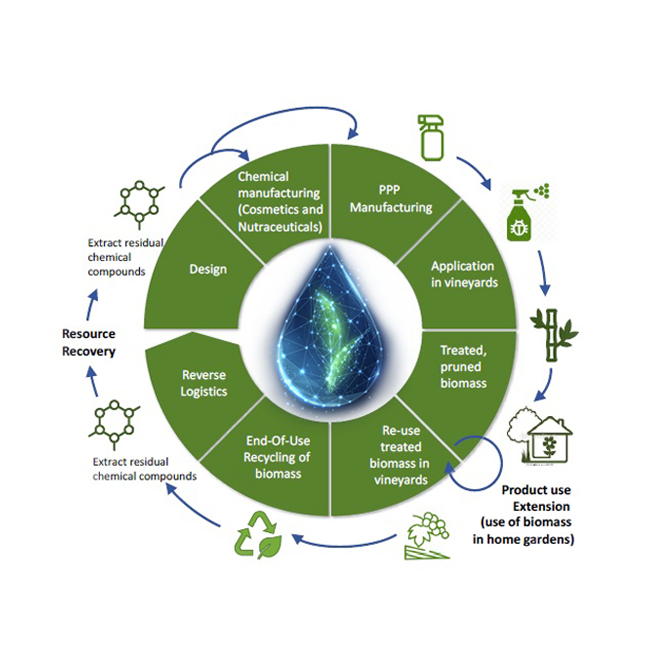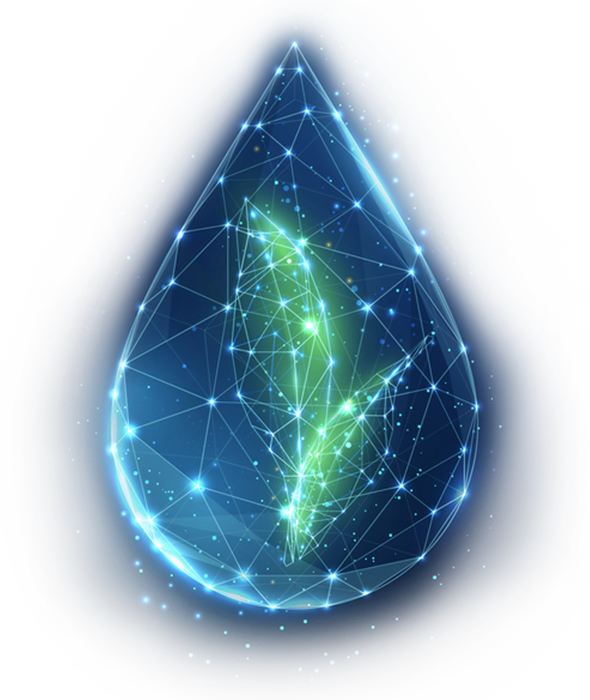Project

Natural Agro’s Circular Value Chain
(Adapted from The Circular Economy Handbook, Peter Lacey)
NATURAL AGRO
NATURAL AGRO project was awarded from the LIFE Programme’s 2022 call for Standard Action Projects and is planned for five years bringing together 3 partner countries: France, Italy and Portugal. In the project Natural Development Group partners with University of Reims Champagne-Ardenne (FR), University of Camerino (IT), University of Bologna (IT), INIAV, IP – Instituto Nacional de Investigação Agrária e Veterinária (PT), Certiquality (IT), Vitepiù (IT), Vinidea (IT) and ENTOPAN (IT) as associated partner.
The project aims to drive European viticulture towards more efficient, sustainable, toxic-free crop protection, through reducing and even eliminating the use of xenobiotic compounds in plant protection products (PPPs). The project is coordinated by an Italian company, Natural Development Group, located in Castel Maggiore (Bologna) already very active in the field of fertilizers. The mission of the Natural Agro project is to adopt agricultural production, particularly for vines, more respectful of the environment by developing an effective and sustainable strategy to fight against parasitic diseases. Based on the importance, in particular economic, of the cultivation of grapevines in Europe, the project aims to reduce the use of pesticides and fertilizers by proposing a new innovative solution to the current market. As viticulture is one of the most profitable activities in the EU, covering a land area of about 3.2 million hectares, winegrowers face two key challenges in making the practice sustainable and environmentally safe. Furthermore the misutilization of grape biomass, which is incinerated on-field, resulting in excessive emission of GHGs and the excessive usage of chemical pesticides in grape production represent a negative management of the viticulture . Winegrowers are dependent on the use of chemical pesticides as grapevine is susceptible to many fungal diseases, such as Downy Mildew (DM) and Grapevine Trunk Diseases (GTD), which have the potential to cause serious crop damage and substantial economic losses to EU winegrowers.
As the primary treatment of such diseases, Copper (Cu) intensive PPPs are considered the most important antifungal product in organic viticulture. However, the dependence on Cu PPPs is of urgent concern, due to the increasing, toxic accumulation of Cu in soil and water, and its potential assimilation into the fruit, with severe impact on human health.

To tackle these environmental challenges, Natural Development Group and the partners have been performing extensive research developing an innovative Cu-reduced PPP product, by combining a suspension of carbonated hydroxyapatite, a biomimetic carrier, with natural oil blends.
Natural oils are very important, because they are natural, and it is the goal of the European Commission to decrease the amount of organic PPPs, as well as copper, to eliminate contamination and pollution.
One of the main objective is to develop and evaluate two target specific formulations (for DM and GTD) by using carbonated hydroxyapatite and natural oil blends with very low or no Copper. The target is to achieve Cu reduced formulations with concentrations decreased from current levels of 3.5% to 0% (completely copper free). Consequently the partners will also demonstrate the efficacy of these PPPs at a wider scale by conducting a multi-locational trial across living labs and vineyards in Italy, France, and Portugal and as final result, two PPP formulations will be fully developed and qualified for commercial introduction.
An important and equally important role for NATURAL AGRO project is to develop circular approaches to effectively handle vineyard biomass, as a means to significantly cut the GHGs emissions associated with typical incineration of pruned biomass on field. In fact by eliminating Cu in the formulations and replacing organic fungicides with essential oils, the contamination of the grapevine will be limited , allowing to utilize the waste wood of the vineyards as a source of natural products such as natural products with insecticide and/or fungicide activity which then will go back into novel formulation.
In conclusion, the Natural Agro project represents a step forward towards a "new conception" of viticulture and viniculture, based on the management of the quality of grapes and wine using new methodologies/technologies and knowledge.


